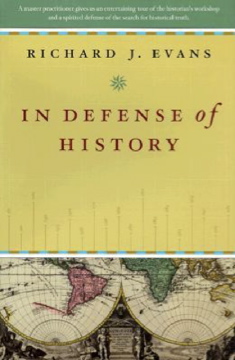Postmodernism affects everything it touches, often in ways of which we are not aware. Its effects on the writing of history are to make history inaccessible to all but a few academic elites, or to reinterpret history in the image of the historian, with little regard for documentary evidence. Richard Evans explains this phenomenon in his book, In Defense of History (W.W. Norton, 1999).  My own experience in a very postmodernized philosophy program at a Philadelphia area University bears out this observation.
My own experience in a very postmodernized philosophy program at a Philadelphia area University bears out this observation.
Many aspects of postmodernism can be understood, sociologically, as a way of compensating for this loss of power within the world at large and within the university as an institution. For it places enormous, indeed total intellectual power in the hands of the academic interpreter, the critic, and the historian. If the intentions of the author of a text are irrelevant to a text’s meaning—if meaning is placed in the text by the reader, the interpreter—and if the past is a text like any other, then the historian is effectively reinventing the past every time he or she reads or writes about it. The past no longer has the power to confine the researcher within the bounds of facts. Historians and critics are now omnipotent.
To underline this, the postmodernists have developed a new level of specialized language and jargon, borrowed largely from literary theory, which has rendered their work opaque to anyone except other postmodernists. The enterprise thus seems not only self-regarding but, ironically in view of its criticism of hierarchy and prioritization, elitist as well. Its narcissism and elitism both can be seen as compensatory mechanisms for the loss of real power, income, and status suffered by its academic practitioners over the past ten to fifteen years. It all reminds one of Oscar Wilde’s saying that any fool can make history; it takes a genius to write it (p. 172-3).


0 Comments